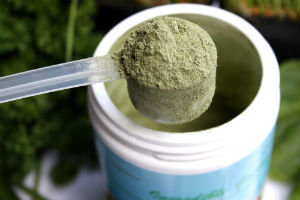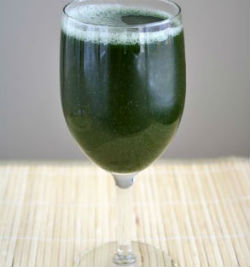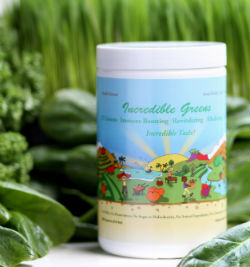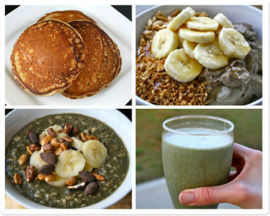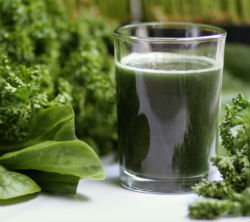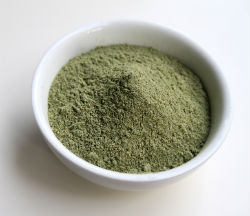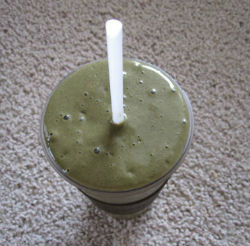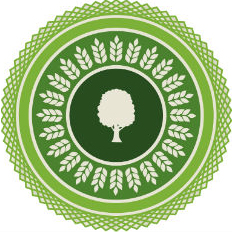The formula for Incredible Greens was designed to promote the four pillars of wellness: digestion, immunity, energy, and detoxification. It draws foods from all over the world to best accomplish this goal.
A Nutritional Swiss Army Knife
Having the right expectations is important. Please read.
Anti-oxidant Capacity
A study conducted on elderly Koreans found that spirulina helped increase their anti-oxidative capacity.
Diets rich in dietary soluble fiber also resulted in a reduction in oxidative stress in fatty rats.
The high level of anti-oxidants in bee pollen indicate that it might be a powerful free radical scavenger, possibly due to its high polyphenol content. However, the anti-oxidative capacities of bee pollen are highest when it's eaten fresh. The royal jelly made by honey bees has also demonstrated an ability to help enhance the immune system.
A comparative study done between tropical fruits found that acerola berry had the highest anti-oxidant levels.
Cellular Health
In a study conducted with rats, natural chlorophyll demonstrated an ability to slow cell-growth within the colon. Three other studies conducted on mice demonstrated an ability for chlorella to slow tumor growth. Also see here and here.
Dulse has been shown to reduce cell proliferation in vivo, possibly because of the bio-activity of its polyphenols. It also increases your body's anti-oxidant levels.
In one study cancercous cell lines treated with parsley extract showed accelerated cell death, hypothesized to be caused by parsley's anti-oxidative properties.
In one study conducted with mice, cell growth in cancerous colon cells was slowed by treatment with dietary pectin and calcium. Another study found that a diet rich in fruit pectin slowed cell growth in the prostate. Beet juice extract has also exhibited a chilling effect on prostate cell proliferation.
In the gut, probiotics bacteria like B. bifidum can help slow cancerous cell growth.
This study suggests that green tea may turn off genes that aid in the onset of cancer.
Cancerous human breast cells displayed 2% slower growth when treated with suma root, and another study found that the herb might be able to slow cell proliferation in other capacities.
This paper outlines how chemicals in grape seed extract help moderate cell signaling pathways, which give the extract anti-cancerous properties.
Blood Pressure
Rats suffering from reperfusion injuries experienced lower blood pressure after taking Bilberry extract, due to reduced coronary blood flow.
A study conducted to study the effects of chlorella on hypertension found that afflicted patients had significantly lower diastolic blood pressure and lipid levels after taking a supplement for 4 weeks. A study conducted in Mexico also found that Spirulina helps lower diastolic and systolic blood pressures.
Parsley has also been shown to help lower blood pressure because its diuretic effects reduce arterial pressure.
Heart Health
This paper describes the various studies and mechanisms that allow grape seed extract to improve athersclerosis, as well as lower LDL cholesterol.
A well publicized study done by the American Medical Association studied over 47,000 patients and found that green tea helps reduce mortality from all types of cardiovascular disease.
Immune System Stimulation
Researchers found that Wheat Grass allowed breast cancer patients to recover more effectively from chemotherapy.
These papers outline how different types of bifido bacterium (like B. Longum and B. Bifidum) help prevent the potency of harmful enzymes, exclude pathogenic bacteria from your gut, and promote intestinal immunity. Bee pollen has also been shown to help inhibit the growth of harmful bacteria.
Echinacea has been shown to increase the body's production of immunoglobulins, an important type of molecule in your immune system. This study also suggested that it may help the body fight respiratory tract infections.
Licorice has also been linked to increased immune cell production and an increased ability for your body to fight off certain types of viruses. In Korea patients given chlorella tablets produced more interleukins, an important molecule for immune system regulation.
Detoxification
When pregnant women were given chlorella tablets they transferred less dioxins (a harmful chemical) to their infants, which helps improve immunological development.
Fruit pectin supplements allowed toxic metallic compounds called cholates to be removed from the body 74% faster. Another study found that apple fiber had a similar effect.
Dialysis patients treated with L. Acidophilus resulted in an increased removal of toxic amines from the blood.
HDL Cholesterol
In Mexico, a group of 36 subjects had significantly lower levels of HDL and total cholesterol after taking spirulina tablets for 6 weeks.
LDL Cholesterol
Alfalfa seeds have been shown to reduce plasma cholesterol with a small sample of humans, and lower LDL cholesterol levels in patients with hyperlipoproteinemia.
The oil found in rice bran lowered LDL cholesterol levels in 26 patients by 7% in a clinical trial conducted by Louisiana State University. Another study found that LDL cholesterol levels were lowered when human subjects took a fruit pectin supplement for 15 weeks.
Patients that were hypercholesterolemic, taking a milk supplement fermented with L. Acidophilus lowered their serum cholesterol levels after two 4-week treatments. Milk fermented with S. Thermophilus reduced LDL cholesterol levels by 8% in a subject group.
Total Cholesterol
Alfalfa seeds have been shown to reduce plasma cholesterol with a small sample of humans, and lower LDL cholesterol levels in patients with hyperlipoproteinemia.
LDL and total serum cholesterol levels were also reduced in a study where patients took royal jelly pills for 4 weeks.
Fat Metabolism
Studies have shown that dulse and other edible seaweeds tend to increase the body's rate of lipid metabolism. See also here.
In one study diabetic rats that were fed Acerola juice exhibited lower levels of triglycerides, as well as cholesterol and blood sugar.
Lipase is a key regulatory enzyme that aids in fat metabolism by by breaking complex fatty acids into smaller molecules. See also here.
In this paper chemicals found in licorice are linked to increased fat-tissue differentiation, which helps lower blood sugar levels.
A study done with mice found that compounds in grape seed called catechins help reduce diet induced obesity.
Clinical trials done with humans have found that green tea leaves increase 24 hour fat metabolism.
Protein Metabolism
This paper demonstrates how papain allows the body to separate ingested proteins, making them easily metabolized by the body.
Protein Metabolism
Bifido bacterium have been shown to help the body efficiently digest complex polysaccharides. Bifido longum helps the body digest certain carbohydrates that would otherwise be inedible
Cognition and Memory
Middle-aged women who took Gingko biloba supplements for 6 weeks displayed better memory recall after the study. Gingko biloba has also been linked to better overall cognitive performance. (But be aware that results linking Gingko biloba to increased mental performance are mixed).
Eleuthero root has also been linked to improved memory performance.
In a study done with mice acerola juice was associated with neuro-chemical profiles that displayed anti-depressant activity.
Circulation and Inflammation
Grape seed is believed to cause better circulation throughout the body, particularly after wounds or surgery.
Wheat grass is believed to reduce the need for blood transfusions for patients with a condition called thalassemia major.
In Korea a study conducted on 57 patients found that after taking an eleuthero root supplement for 6 weeks, the majority of subjects reported a reduction in knee arthritis with no significant side effects. Another study done in the country found that spirulina helped lower lipid levels, and stimulate the immune system in elderly koreans. Grape seed extract has also been shown to have an anti-inflammatory effect. (Although the study was performed on rats, not humans, decreasing its significance).
Physical Performance
A study conducted with men found that most subjects performed better across a variety of cardiovascular endurance tests after taking eleuthero root after 8 weeks.
Beet root is also believed to increase your endurance. Chlorella has been shown to reduce muscular breakdown after exercise.
Other Health Benefits
Folate supplemented milk that was fermented with S. Thermophilus resulted in higher blood iron levels than milk that wasn't fermened with the bacteria.
Folk tales have always suggested that milk thistle is good for your liver. Recent studies found that the herb can help alleviate alcohol-induced oxidative stress and has shown potential for treating other chronic liver diseases.
Parsley has a long history of being used to improve kidney function, and recent studies suggest there is truth to these allegations. Also see here.
Incredibly Useful
Whole Foods. The Way Nature Intended.
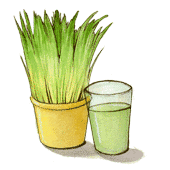
Wheat Grass
Wheat grass is taken from a special part of the wheat plant called a cotyledon, and is allowed to grow longer, giving it higher levels of chlorophyll, vitamin E, and phosphorus. Nutrients in wheat grass aid in detoxification and digestion.
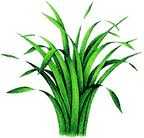
Barley Grass
In addition to the traditional benefits of grasses, young barley grass can have as many as 70 different trace minerals and is an excellent source of SOD (superoxide dismutase), an important enzyme that prevents cell oxidation and promotes intracellular health. It aids intracellular health, mineral absorption and detoxification.
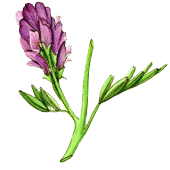
Alfalfa Juice
A concentrated extract from the popular root, alfalfa juice offers condensed portions of the nutrients typically found in alfalfa: Vitamins A, C, E, and K, as well as calcium, potassium, and iron. Studies have shown alfalfa may help improve bone health.
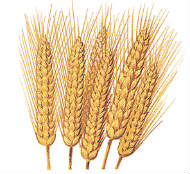
Wheat Sprout
Wheat sprout contains grains picked at the beginning of the germination process when it's "sprouting." These kernels can have elevated nutrient levels compared to traditionally processed whole grains. Wheat sprout has been shown to have higher levels of folate and fiber than non-sprouted wheat

Spirulina
Spirulina is a green algae that comes from the cyanobacteria strains Arthrospira platensis and Arthrospira maxima. Spirulina is a good source of protein, Vitamins A, B, C, D, and E, as well as potassium and calcium. In studies it's demonstrated an ability to improve memory in some clinical situations.

Chlorella
Chlorella is a single celled green algae that's high in protein and chlorophyll. It's been shown to have some anti-cancer properties as well as aid in detoxification and improving circulation and cellular health.

Nova Scotia Dulse
Dulse is a red algae high in potassium, iodine, calcium, protein and fiber. Its high concentration of polyphenols is believed to give it high anti-oxidative properties and positive effects on your metabolism.
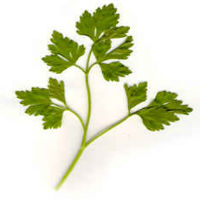
Parsley
Parsley's a green mediterranean vegetable high in vitamin C, K, folate, and iron. It's a strong diuretic and has been shown to have anti-oxidant properties and improve renal function
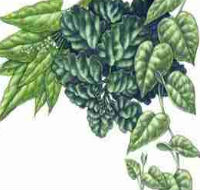
Spinach
Your mother was right: you need to eat your spinach. When it comes to nutrients, it's got the whole she-bang. Vitamins A, B, C, E, folate, iron, protein...if it's good for you, it's probably in there. In some cases spinach has been shown to have anti-aging, brain-enhancing, and alkalizing effects.
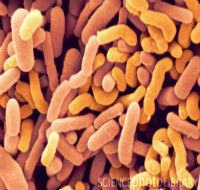
L. Acidophilus
L. Acidophilus is a strain of bacteria that withstands conditions in the intestine well and has been shown to help with digestion. In some cases L. Acidophilus has been shown to aid in toxin removal from the intenstine and improve circulation.
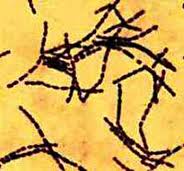
L. Bulgaricus
Another strain commonly found in yogurt, L Bulgaricus (officially known as Lactobacillus delbrueckii subsp. bulgaricus) is a strain of bacteria that's been shown to help increase metabolism and improve various aspects of digestion.
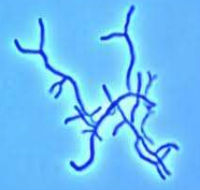
B. Bifidum
Bifido bacterium are naturally found in the colon and helps regulate intestinal microbes. B. Bifidum has been known to help with carbohydrate metabolism, intestine detoxification, and exhibits some positive effect on cellular health.
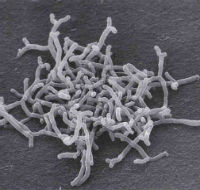
B. Longum
Bifido longum is a probiotic that lives in your gut and converts sugar into lactic acid. It's been shown to be important for maintaining a healthy digestive tract, improve your immune system and metabolism, and protect against toxic bacteria. It's one of the first bacteria to colonize in your body, and its presence helps calibrate your immune system against other pathogens and protect against different food allergies.
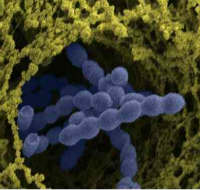
Thermophilus
S. Thermophilus is commonly found in yogurt and has mild probiotic properties. It's been shown to help reduce LDL cholesterol, improve the bodies anti-oxidant capacity, and increase iron blood levels.
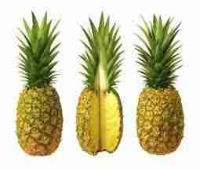
Bromelain
Bromelain is a substance that consists of two protease enzymes that are usually extracted from pineapple skin. It may help protect against inflammation and improve circulation.
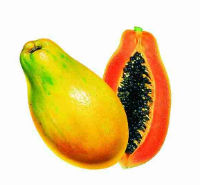
Papain
Papain is found in the skin of unripe papaya and contains 345 amino acid residues. It plays an important role in protein digestion.
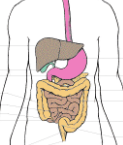
Pepsin
Pepsin comes from a precursor molecule called pepsinogen, which is naturally found in the stomach and aids in protein digestion. Pepsinogen, trypsin, and chymotrypsin together are responsible for most of the protein-breaking (proteolytic) activity in the human digestive system.
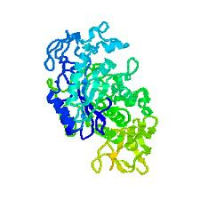
Lipase
Lipase is a type of enzyme that helps the body break down fat. Lipases often help break down tri-glycerides into simpler compounds, and can also assist in cell signaling and protect against some types of inflammation. In the human body the most common form of lipase is Human Pancreatic Lipase (HPL), and is found in the pancreas.

Echinacea
Echinacea is a genus of herbal flowering plants grown in eastern and central North America. Echinacea has been shown to stimulate the immune system and reduce the severity of the common cold.
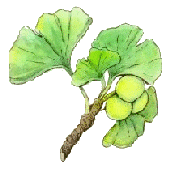
Ginkgo Biloba
Ginkgo biloba is an herbal plant found in southeast Asia that has a long history of medicinal use to treat cognitive disorders. Modern research has not verified all the folkloric claims attributed to the plant, but some studies suggest it may improve cognition and memory.
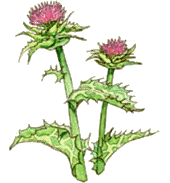
Milk Thistle
Milk thistle is a flowering plant of the daisy family and has historically been used to promote liver health.
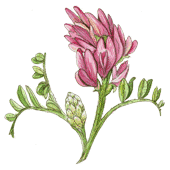
Astragalus
Astragalus is a genus of herbs also known as milk-vetch, goat's-thorn, and locoweed. Traditionally, astragalus has been used to help stimulate the immune system and treat common colds. However, human clinical trials studying the efficacy of these effects have been limited.
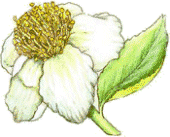
Green Tea Catechins
Green tea leaves have high concentrations of phenolic acids and flavonoids as well as minerals like chromium, manganese, zinc, and selenium. Some studies have linked green tea to positive effects on circulation, cellular health, and increased metabolism. The green tea extract in Incredible Greens is 95% catechins by volume.
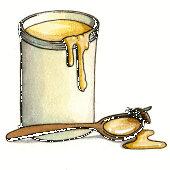
Royal Jelly
Royal jelly is a honey-bee secretion that's used to feed larvae to turn them into Queen Bees, hence the name. Royal jelly has displayed the ability to aid in hepatic detoxification, wound-healing, and improve circulation and promote well being
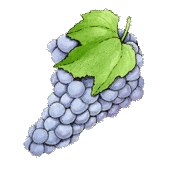
Grapeseed Extract
Grape seed extract is a concentrate taken from grape seeds that has a high concentration of Vitamin E, flavonoids, and linoleic acid. Grape seed extract generally demonstrates a high level of anti-oxidative ability, which can help the body scavenge free radicals and improve cellular health.
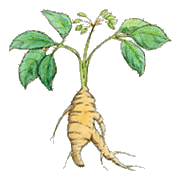
Eleuthero Root
Eleuthero root is an herb grown in northeast Asia that also goes by the name Siberian Ginseng and E. Senticosus in medical literature. It's been referenced as a chinese homeopathic remedy for hundreds of years. In some studies Eleuthero has been shown to increase memory, endurance, and reduce inflammation..
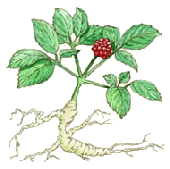
Suma Root
Also known as Brazilian ginseng, suma root is an herbaceous plant found in South America. It's commonly used to increase athletic performance and some studies have suggested that Suma root can help slow cell proliferation in certain clinical settings.
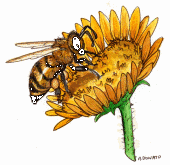
Bee Pollen
Bee pollen is a substance formed when honeybees pack pollen into concentrated granules. Its chemical profile is complex, and can vary on the type of flower and location it was made in. Studies have shown that bee pollen can have a high concentration of phenolic compounds and anti-oxidants, which can help neutralize free radicals within the body
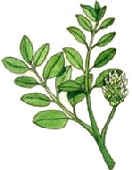
Licorice Root
The licorice plant is found in southern europe and parts of Asia, and is considered a good source of isoflavones. Licorice has been shown to have anti-viral activity and mild immunity enhancing properties.
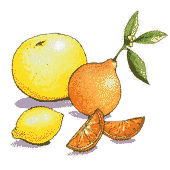
Apple Fiber and Apple Pectin
Pectin is a complex polysaccharide found in apple skins and other types of fruit pulp. It's high in fiber, and has been shown to help lower cholesterol and help the body with detoxification. It's also been shown to improve cellular health in certain situations.
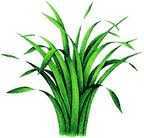
Barley Malt
A naturally sweet grain, the fermentation process in barley malt allows for its sugar to have a softer effect on blood sugar levels while still providing the traditional health benefits of a whole grain.
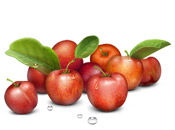
Acerola Berry
Acerola is a berry grown in central America that has very high Vitamin C levels. A glass of freshly squeezed Acerola juice has more vitamin C than 14 liters of Orange juice! The anti-oxidant levels in Acerola berry are also very high.
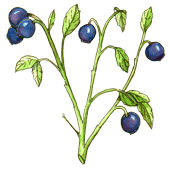
Bilberry Extract
Also called huckleberry, bilberry is an edible berry that's been used in Europe for medicinal purposes for over a thousand years. Tradition states that bilberry is useful for improving vision. Bilberries are a good source of flavonoids which have a demonstrated anti-oxidative capacity.
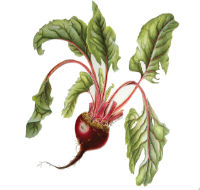
Beetroot Juice
Garden beets are an excellent source magnesium, potassium, vitamin C, and a nutrient called betaine, which some studies have shown to help improve cardiovascular health. Evidence suggests that nutrients in beets help improve circulation and athletic performance.

Soy Lecithin
Lecithin is a fatty acid found inside our cell walls that helps transport cholesterol through the body and protect the nervous system. Our lecithin is non-gmo and extracted with water, NOT HEXANE.
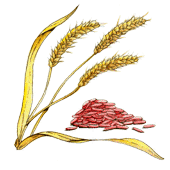
Rice Bran Solubles
Bran solubles are the hard embryo that coats certain plant seeds that give them their nutrients. They're high in fiber, protein, essential fatty acids, B vitamins, and vitamin E. It's part fiber, part seed, part plant protein.

